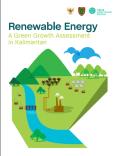
This report, Renewable Energy: A green growth assessment in Kalimantan, assesses the monetary costs and benefits associated with renewable energy projects in Central and East Kalimantan.
This is the first comprehensive report on Botswana’s energy accounts project. It presents the methodology, data compilation process, results, and policy messages. The prime focus of the report is on the Physical Energy Flow Accounts. The accounts cover two energy products—coal and electricity—in physical energy units during the reference period 2010/11 to 2014/15.
This case study exhibits the compilation of experimental Indonesia energy flow accounts, which are intended to broaden the coverage of accounts in Sisnerling (Indonesian Integrated System of Economic and Environment Accounts). This report contains various accounts describing the supply and use of energy by the environment and economic units as well as air emissions released to the environment as a result of energy use activities.
This study evaluates options by which the Indian economy can move towards an inclusive green growth paradigm of development. It combines the rigorous scientific and economic studies done at the national and state levels (Punjab and Himachal Pradesh). The objective of this analysis is to understand the impact in India of energy-related green growth interventions on future energy demand, emissions, energy access, energy security, and development indicators.
A Case Study on the Development of Technical Guidelines for Greenhouse Gas Reporting in South Africa
This report forms part of a project that aims to develop technical guidelines for greenhouse gas (GHG) emissions reporting in South Africa. It describes the lessons learned in building guidance for mandatory GHG reporting in a country that has shown leadership in voluntary corporate GHG reporting.

To support Ministry of Construction (MOC) to implement the NDC, the Global Green Growth Institute (GGGI) has conducted an assessment of the potential green city actions that would help achieve Viet Nam’s NDC commitments. This paper, Achieving Viet Nam’s NDC in the Urban Sector, outlines the findings from the assessment in two sectors contributing the majority of urban GHG emissions: waste and energy.
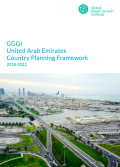
This Country Planning Framework (CPF) sets the strategic direction for the Global Green Growth Institute (GGGI) in the United Arab Emirates (UAE) over the period 2018-2022.
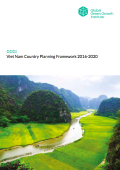
This Country Planning Framework (CPF) sets the strategic direction for the Global Green Growth Institute (GGGI) in Vietnam over the period 2016 to 2020.
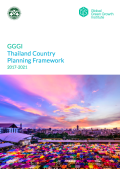
This Country Planning Framework (CPF) sets the strategic direction for the Global Green Growth Institute (GGGI) in Thailand over the period 2017-2021.
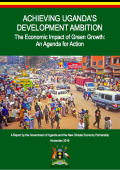
As Uganda embarks on accelerating its economic development, the Government is taking a conscious step to ensure that growth is socially inclusive and that the protection of the environment is upheld. This study outlines the potential for green growth to support structural transformation.
